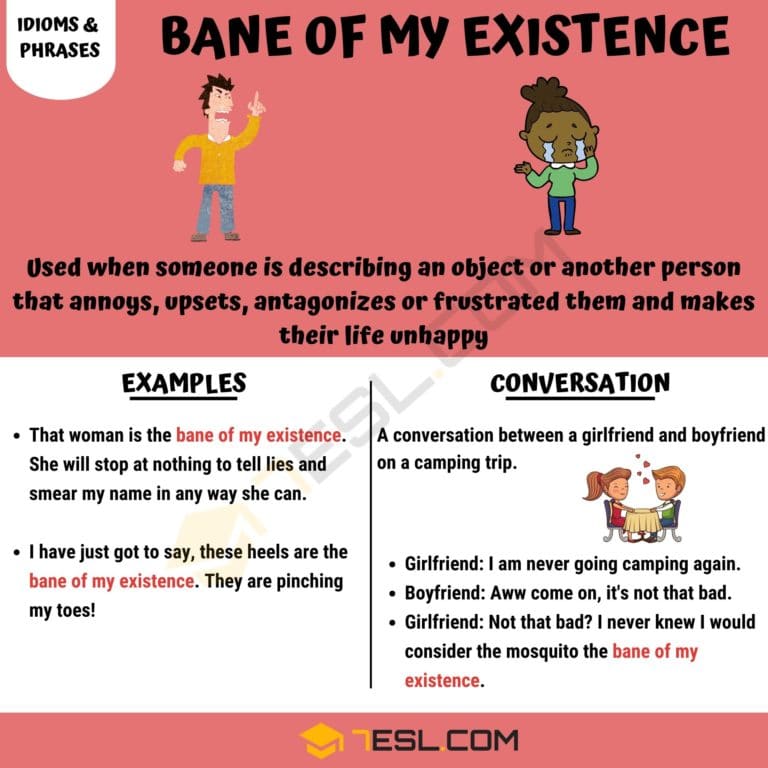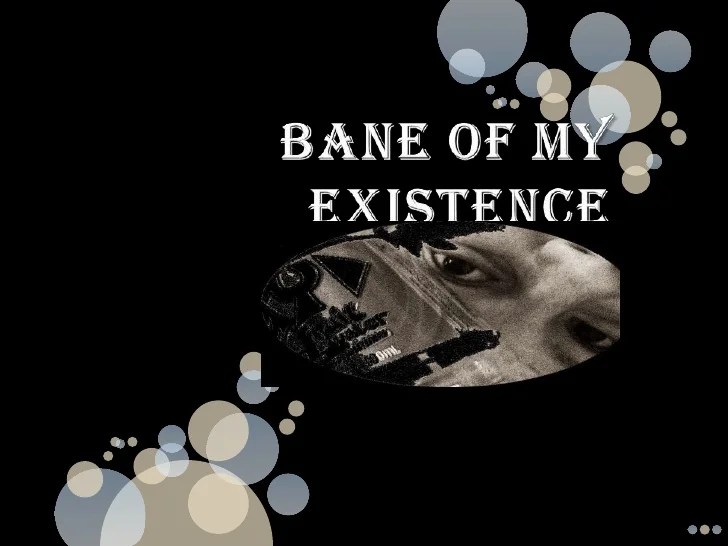The phrase "bane of my existence" holds a special place in the tapestry of human expression. It is a powerful idiom, often used to describe that which causes persistent annoyance, frustration, or hardship in our lives. Whether it’s a nagging problem, an unsolvable challenge, or an unrelenting enemy, the "bane of my existence" is a dramatic way of capturing the essence of what drains our patience or tests our resilience.
From its literary origins to its modern-day usage, the "bane of my existence" has evolved into a universal metaphor. It resonates across cultures and languages, symbolizing the struggles we all face. Interestingly, the phrase isn’t just about negativity—it also hints at our determination to confront and overcome obstacles. It is a linguistic tool that connects us to the shared human experience of dealing with life’s challenges, no matter how big or small.
In this article, we’ll delve into the rich history, nuanced meanings, and real-world applications of this evocative phrase. By exploring its cultural significance, psychological implications, and its role in literature and pop culture, we’ll uncover why the "bane of my existence" continues to be a relevant and relatable part of our vocabulary. Whether you’ve used it to describe a persistent issue at work, a relentless adversary, or even a personal habit you can’t seem to shake, this phrase captures the spirit of human endurance and growth.
Table of Contents
- What Does "Bane of My Existence" Mean?
- Origin and History of the Phrase
- How Is the Phrase Used in Literature?
- Psychological Impact: Why Do We Use It?
- Is the Phrase Relevant in Modern Times?
- "Bane of My Existence" in Pop Culture
- How to Identify Your Own Bane?
- Examples of Common Banes in Daily Life
- Can a Bane Be Transformed into a Strength?
- How to Deal with the Bane of Your Existence?
- What Lessons Can We Learn from Our Banes?
- Real-Life Stories of Overcoming Banes
- Frequently Asked Questions
- Conclusion
What Does "Bane of My Existence" Mean?
The phrase "bane of my existence" is often used to express deep frustration or annoyance caused by a person, situation, or thing. The word "bane" itself originates from Old English, meaning something that causes death or destruction. Over time, its usage softened to signify anything that causes distress or misery. The phrase, therefore, encapsulates a poetic way of saying, "This is what makes my life difficult."
Most commonly, people use the phrase in a hyperbolic manner. For example:
- Someone might say, "Traffic jams are the bane of my existence," to express frustration with daily commutes.
- In a lighter context, a student might quip, "Math exams are the bane of my existence," highlighting their struggle with the subject.
Despite its dramatic tone, the phrase doesn’t always carry negative connotations. It can also reflect a sense of humor or exaggeration, depending on the situation. For instance, a parent might jokingly call their child’s messy behavior the "bane of their existence," while still expressing love and affection.
Origin and History of the Phrase
The roots of the phrase "bane of my existence" can be traced back to medieval English literature. The term "bane" was frequently used to describe poisons or deadly substances in early texts. As the English language evolved, "bane" took on a more metaphorical meaning, representing sources of distress or suffering.
One of the earliest recorded uses of the phrase in its modern form is found in 19th-century literature. Writers of the Romantic and Victorian eras often employed it to describe emotional torment or unrequited love. For example, in Charlotte Brontë’s "Jane Eyre," a character might express their woes through such evocative language.
Over centuries, the phrase transitioned from high literature to everyday vernacular, making its way into conversations, films, and even memes. Its enduring popularity speaks to the universal human experience of grappling with challenges and annoyances.
How Is the Phrase Used in Literature?
In literature, the phrase "bane of my existence" often serves as a dramatic device to highlight a character’s emotional or physical struggles. It is especially prevalent in works that delve into themes of love, loss, and conflict.
Some notable examples include:
- Shakespeare’s Plays: While Shakespeare didn’t use the phrase verbatim, his works are filled with similar expressions of anguish and despair. His characters often lament their "torments" or "plagues," which convey a similar sentiment.
- 19th-Century Novels: Authors like Charles Dickens and Jane Austen used the phrase or its equivalents to emphasize societal pressures or personal conflicts faced by their characters.
- Modern Literature: Contemporary authors use the phrase to add a touch of relatability or humor to their narratives. It serves as a shorthand for describing complicated relationships or persistent challenges.
Overall, the phrase enriches storytelling by adding depth and relatability to characters and their experiences.
Psychological Impact: Why Do We Use It?
Why do people feel the need to label something as the "bane of their existence"? Psychologically speaking, the phrase serves as a coping mechanism. By giving a name to our frustrations, we externalize them, making them feel more manageable.
Here’s how it works:
- Validation: Acknowledging a problem reduces its power over us. Saying, "This is the bane of my existence," validates our feelings of frustration.
- Humor: Using the phrase in a lighthearted way can diffuse tension and make serious issues seem less daunting.
- Connection: Sharing our "bane" with others fosters empathy and solidarity. It’s a way of saying, "I’m not alone in this."
Moreover, the phrase underscores human resilience. By identifying our "bane," we also begin the process of overcoming it.
Is the Phrase Relevant in Modern Times?
Absolutely. Despite its historical roots, the phrase "bane of my existence" remains a staple in modern conversations. Its versatility allows it to adapt to different contexts, from serious discussions to casual banter.
For instance:
- On social media, users might post memes or tweets about their "bane," ranging from minor annoyances like slow Wi-Fi to more significant challenges like mental health struggles.
- In professional settings, employees might jokingly refer to tedious tasks or demanding clients as the "bane of their existence."
The phrase’s enduring relevance lies in its ability to succinctly capture a wide range of human experiences, making it a timeless expression.
"Bane of My Existence" in Pop Culture
Pop culture has embraced the phrase "bane of my existence" in various forms, from movies and TV shows to music and memes. Its dramatic tone makes it a favorite among scriptwriters and lyricists looking to add flair to their work.
Examples include:
- Movies: In romantic comedies, characters often use the phrase to describe an antagonist or love interest who frustrates them—before inevitably falling for them.
- TV Shows: Sitcoms frequently employ the phrase for comedic effect, highlighting the quirks of recurring characters or plotlines.
- Music: Songwriters use it to convey themes of heartbreak or longing, adding emotional weight to their lyrics.
Ultimately, the phrase’s presence in pop culture reinforces its status as a relatable and versatile expression.
Article Recommendations

